
Academic publishing is the subfield of publishing which distributes academic research and scholarship. Most academic work is published in academic journal articles, books or theses. The part of academic written output that is not formally published but merely printed up or posted on the Internet is often called "grey literature". Most scientific and scholarly journals, and many academic and scholarly books, though not all, are based on some form of peer review or editorial refereeing to qualify texts for publication. Peer review quality and selectivity standards vary greatly from journal to journal, publisher to publisher, and field to field.
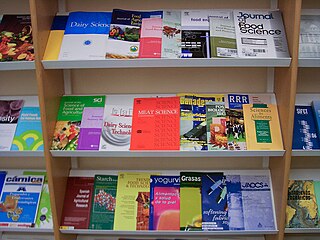
An academic journal or scholarly journal is a periodical publication in which scholarship relating to a particular academic discipline is published. Academic journals serve as permanent and transparent forums for the presentation, scrutiny, and discussion of research. They nearly universally require peer review or other scrutiny from contemporaries competent and established in their respective fields. Content typically takes the form of articles presenting original research, review articles, or book reviews. The purpose of an academic journal, according to Henry Oldenburg, is to give researchers a venue to "impart their knowledge to one another, and contribute what they can to the Grand design of improving natural knowledge, and perfecting all Philosophical Arts, and Sciences."
The Open University of Israel is a distance-education university in Israel. It is one of ten public universities in Israel recognized by the Council of Higher Education (CHE). The Open University is unique in that it does not require a matriculation certificate, psychometric exam, or other entrance exam for admission to undergraduate studies.
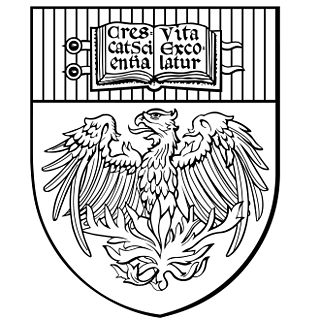
The University of Chicago Press is the largest and one of the oldest university presses in the United States. It is operated by the University of Chicago and publishes a wide variety of academic titles, including The Chicago Manual of Style, numerous academic journals, and advanced monographs in the academic fields.
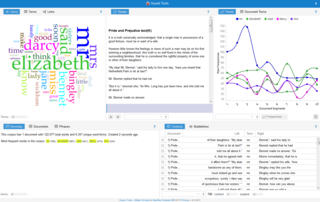
Digital humanities (DH) is an area of scholarly activity at the intersection of computing or digital technologies and the disciplines of the humanities. It includes the systematic use of digital resources in the humanities, as well as the analysis of their application. DH can be defined as new ways of doing scholarship that involve collaborative, transdisciplinary, and computationally engaged research, teaching, and publishing. It brings digital tools and methods to the study of the humanities with the recognition that the printed word is no longer the main medium for knowledge production and distribution.
Stephen Robert Dixon is a British actor and academic.

Project MUSE, a non-profit collaboration between libraries and publishers, is an online database of peer-reviewed academic journals and electronic books. Project MUSE contains digital humanities and social science content from over 250 university presses and scholarly societies around the world. It is an aggregator of digital versions of academic journals, all of which are free of digital rights management (DRM). It operates as a third-party acquisition service like EBSCO, JSTOR, OverDrive, and ProQuest.

Kairos: A Journal of Rhetoric, Technology, and Pedagogy is a biannual peer-reviewed academic journal covering the fields of computers and writing, composition studies, and digital rhetoric. It was established in 1996, and was the first academic journal to publish multimedia webtexts.
The Applied Research in Patacriticism (ARP) was a digital humanities lab based at the University of Virginia founded and run by Jerome McGann and Johanna Drucker. ARP's open-source tools include Juxta, IVANHOE, and Collex. Collex is the social software and faceted browsing backbone of the NINES federation. ARP was funded by the Mellon Foundation.
Scholarly communication involves the creation, publication, dissemination and discovery of academic research, primarily in peer-reviewed journals and books. It is “the system through which research and other scholarly writings are created, evaluated for quality, disseminated to the scholarly community, and preserved for future use." This primarily involves the publication of peer-reviewed academic journals, books and conference papers.
MediaCommons is an in-development all-electronic scholarly publishing network in media studies, being created in partnership with the Institute for the Future of the Book and with the support of New York University and the National Endowment for the Humanities.
Kathleen Fitzpatrick is an American scholar of digital humanities and media studies. She is the Director of Digital Humanities and Professor of English at Michigan State University.
Craig Dietrich is a digital artist and educator affiliated with Occidental College in Los Angeles.
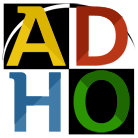
The Alliance of Digital Humanities Organizations (ADHO) is a digital humanities umbrella organization formed in 2005 to coordinate the activities of several regional DH organizations, referred to as constituent organizations. ADHO's constituent organizations are the European Association for Digital Humanities (EADH), the Association for Computers and the Humanities (ACH), the Canadian Society for Digital Humanities (CSDH/SCHN), centerNet, the Australasian Association for Digital Humanities (aaDH), the Japanese Association for Digital Humanities (JADH), Humanistica, the french-speaking association for Digital Humanities, and the Taiwanese Association for Digital Humanities (TADH), Digital Humanities Alliance for research and teaching innovations (DHARTI)from india etc.

The PROSE Awards are presented by the Association of American Publishers’ (AAP) Professional and Scholarly Publishing (PSP) Division.

The William Blake Archive is a digital humanities project started in 1994, a first version of the website was launched in 1996. The project is sponsored by the Library of Congress and supported by the University of North Carolina at Chapel Hill and the University of Rochester. Inspired by the Rossetti Archive, the archive provides digital reproductions of the various works of William Blake, a prominent Romantic-period poet, artist, and engraver, alongside annotation, commentary and scholarly materials related to Blake.
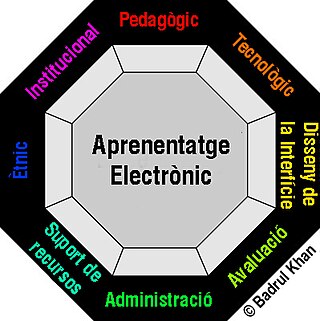
Digital scholarship is the use of digital evidence, methods of inquiry, research, publication and preservation to achieve scholarly and research goals. Digital scholarship can encompass both scholarly communication using digital media and research on digital media. An important aspect of digital scholarship is the effort to establish digital media and social media as credible, professional and legitimate means of research and communication. Digital scholarship has a close association with digital humanities, often serving as the umbrella term for discipline-agnostic digital research methods.
Steve F. Anderson (1963) is Professor of Digital Media at the UCLA School of Theater, Film and Television. Previously, he served as founding director of the Ph.D. program in Media Arts and Practice at the USC School of Cinematic Arts and an Associate Professor in the USC Interactive Media & Games Division. He co-edits the interdisciplinary electronic journal Vectors Journal of Culture and Technology in a Dynamic Vernacular and is the founder of Critical Commons, an online media archive and fair use advocacy network. He is author of the books Technologies of Vision: The War Between Data and Images and Technologies of History: Visual Media and the Eccentricity of the Past. With Christie Milliken he is co-editor of the anthology Reclaiming Popular Documentary.
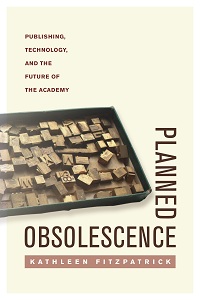
Planned Obsolescence: Publishing, Technology, and the Future of the Academy is a book by Kathleen Fitzpatrick, Director of Scholarly Communication at the Modern Language Association and Visiting Research Professor of English at New York University, published by NYU Press on November 1, 2011. The book provides an overview of issues facing contemporary academic publishing, including the closing of academic presses and the increased pressure on faculty to publish to achieve tenure. Fitzpatrick's central argument is that academia should embrace the possibilities of digital publishing, which will in turn change the culture of academic writing and publishing.

Cheryl Ball is an academic and scholar in rhetoric, composition, and publishing studies, and Director of the Digital Publishing Collaborative at Wayne State University. In the areas of scholarly and digital publishing, Ball is the executive director for the Council of Editors of Learned Journals and the Editor-in-Chief for the Library Publishing Curriculum. Ball also serves as co-editor of Kairos: A Journal of Rhetoric, Technology, and Pedagogy, an open access, online journal dedicated to multimodal academic publishing, which she has edited since 2006. Ball's awards include Best Article on Pedagogy or Curriculum in Technical or Science Communication from the Conference on College Composition and Communication (CCCC), the Computers and Composition Charles Moran Award for Distinguished Service to the Field, and the Technology Innovator Award presented by the CCCC Committee on Computers in Composition and Communication (7Cs). Her book, The New Work of Composing was the winner of the 2012 Computers and Composition Distinguished Book Award. Her contributions to academic research span the areas of digital publishing, new media scholarship, and multimodal writing pedagogy.











